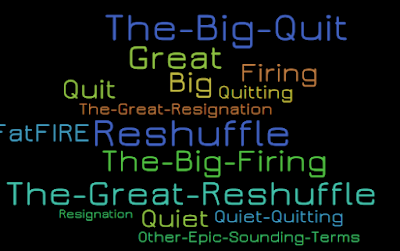- Get link
- X
- Other Apps
You work in an environment where slander accompanies projects, there is gossiping and negative comments galore, all and any ideas are rejected by your supervisor, there is public non support from colleagues when suggestions are made followed by their kudos after the meeting for the same suggestion of ideas. Your supervisor makes snide and sarcastic remarks when you give feedback in meetings, omit you from emails, reduces your responsibilities and unjustifiably demerits you on appraisals without prior warning. Then there’s the final straw justification that “somebody” complained. You are not alone. All the while you continue to put in one hundred percent and still do unpaid overtime work. At some point, you do not remember when you arrived at the idea, but you know it did not come upon you suddenly. You begin to disengage from this less than ideal work environment. While the scenario highlights many issues leadership, organization and management, you begin to think of your personal responsibilities
Don't worry, you’re disillusioned, not delusional and you’re not alone. What you’re experiencing is a persistent anathema in many modern workplaces and your response of disengagement is one that every employee faces at some point in their career. There are several steps you can take to deal with your current situation : bare it, transfer, or what might seem like your only option —resign.
Many employees have taken the extreme step and resolved to “vote with their feet”. It has become such a trend in recent times that the phenomenon came to be called “The Great Resignation”. The Great Resignation is a trend characterized by a large number of employees voluntarily leaving their jobs, seeking better work-life balance, purpose, and improved job satisfaction. It represents workers feeling empowered to quit jobs that they find unsatisfactory. Now, let’s be clear, while you are certainly entitled to reevaluate your priorities and prioritize your well being, I am not advising you to resign from your job! What you’re working through is reevaluating your relationship with work. You’re not burnt out or lazy. You’ve simply arrived at two strategies for correcting an imbalanced relationship with work and your employer.
Now for my advice:
There is another option: don't quiet quit—speak up! Speaking up early on creates open communication and a more transparent and understanding work environment. It gives you the opportunity to communicate the issues affecting your job satisfaction and well-being. This can stave off negatively affecting your development as an employee. Remember, your reputation follows you throughout your career. Don’t quit. Reevaluate and adapt.
- Get link
- X
- Other Apps
Comments


Thoroughly enjoyed this one Lana. Love your perspective on this prevailing issue. Those feelings are certainly experienced by many of us in the workplace. Awesome writing.
ReplyDeleteThanks Arthur! I'm glad this perspective resonated with you. Like you, I hope this my views on this topic validates those who have struggled with similar frustrations. I am grateful for engaged readers like yourself.
ReplyDelete